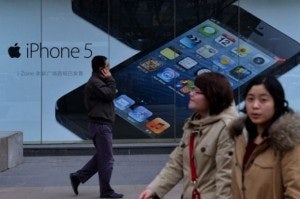Despite Apple’s China Apology, State Media Publishes New Criticisms#

An Apple billboard in China.
After dealing with a Chinese government-sponsored public relations nightmare last month that resulted in Apple's public, yet vague, apology in response to accusations of unfair warranty practices against Chinese consumers, new Chinese state-run media reports indicate that the company's China woes don’t seem to be over just yet. Although the corporation appears eager to put the controversy far behind it, the Chinese government may have other plans if the prior experiences of foreign companies such as Google are any indication.
“60 percent of the public has a lower opinion of Apple after heated debate,” said a Chinese-language People’s Daily headline from yesterday, which cited a survey taken in the wake of CCTV’s campaign against the company that began in mid-March. The survey results, some of which are visualized in an article on Tech in Asia, went on to report that 80 percent of Chinese consumers believe Apple’s policies to be discriminatory, one of the main state-led accusations that prompted the company’s public apology last month.
The report came only one day after China's state-run news also reported that Apple had been ordered by the government to remove all "pornographic content" from its app store. Although the report stated that the order was part of an investigation of 198 different companies, Apple was singled out as the only company named in the headline.
Chinese officials and state-controlled media appeared conciliatory after Apple’s initial apology, but these new reports indicate that that the Chinese government does not plan to make the country a fully welcoming environment for Apple anytime soon. This news must be particularly dismaying for Apple, considering the fact that CEO Tim Cook has expressed hopes that China will someday become home to the company’s largest market.
Since the first round of attacks, theories floated regarding the government's possible motivations for going after Apple have included sentiments that Apple is not investing enough in China despite massive mainland profits, wishes to impose harsher censorship, or the desire to harm Apple's image in order to make room for greater success among domestic companies.
That last argument has some credence considering recent news that Chinese telecom giant Huawei has expressed plans to become a major smart phone brand, yet faces stiff competition from foreign companies such as Apple. In addition, other non-Chinese companies including Microsoft and Google have recently been targeted for similar criticisms. A white paper by the Ministry of Industry and Information Technology’s China Academy of Telecommunication Research has accused Google of discriminating against Chinese customers and stated that the 80 percent of smart phones using the company's Android system marked "excessive dependence" on the system. Microsoft has also met this month with accusations similar to those made against Apple, showing that all foreign competitors are susceptible to these types of attacks.
The “pornographic content” news is particularly reminiscent of a similar 2009 CCTV report on Google’s search engine technology, which also accused the corporation of being too susceptible to inappropriate content. This predated the enormous censorship controversy between Google and the government that resulted in the shuttering of Google's China site and a market win for competitor Baidu. It remains to be seen as to whether or not Apple will someday feel the same level of pressure, but it will certainly have to use its innovative talent to strategize ways to deal with this tricky business terrain.